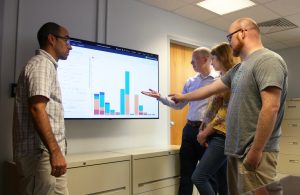Jeff always looks so natural in these photos! 🙂
Monthly Archives: September 2019
Interested in arts education and self-regulated learning?
Check out this cool collaboration between CLICK and Keith Sawyer:
“There is a lack of research and practice focused on how to foster higher-order processing, such as creative performance, within higher education settings. To address this gap in research, we chose to study pedagogical practices in schools of art and design, where one of the intended learning outcomes is creativity. Based upon data gathered as part of a larger study (Sawyer in Thinking Skills and Creativity, http://doi.org/10.1016/J.TSC.2018.08.002, 2018), we found that among a large number of creative performance pedagogical practices we identified, a subset seemed to foster self-regulated learning (SRL). Therefore, the goal of our study was to identify the ways art and design professors enacted practices that foster their students’ self-regulation during learning and performance. We found these professors utilized a number of direct and indirect methods of fostering their students’ SRL, all intended to enhance students’ ability to enact creative performance. In addition to revealing interesting comparisons between SRL in art and design and other more commonly studied contexts such as science or history, our findings suggested numerous directions for expanding SRL models, including a greater focus on process as the outcome of SRL, a need to continue research into SRL during higher-order processing, and gaps regarding the development of SRL.”
Learning Analytics and CLICK!
Check out this cool new learning analytics publication with CLICK members and Matt Bernacki!
“The scientific literacy and conceptual understanding demands of the 21st century have necessitated fundamental changes in science education, including changes from traditional lecture to more active learning pedagogies. The affordances of such pedagogies can benefit students, but only when they are able to enact effective and efficient self-regulated learning processing. More research is needed to understand how and when students should self-regulate during science learning, as well as how to help those students who struggle to do so. In this study, we leveraged multimodal online interaction trace data from 408 college students enrolled in an introductory biology class to investigate the temporal nature of self-regulation during science education. Using latent profile analyses, we found differences in self-regulatory processing predicted course performance, with implications for the development of systems for identifying and supporting students who are likely to struggle in active learning science education environments.”
New CLICK publication on college student learning!
Excited to share this new published study by CLICK lab members:
“First-year courses have been used to bolster college student success, but empirical evidence on their efficacy is mixed. We investigated whether a first-year science of learning course, focused on self-regulated learning, would benefit first-generation college students. We randomly assigned students to a treatment condition involving enrollment in the course, a comparison condition in which students had access to online course materials only, or a control condition. From this larger study, we recruited 43 students to participate in a laboratory task involving learning about the circulatory system with a computer. We found that treatment and comparison students experienced greater changes in conceptual knowledge than the control group, and we found differences in the enactment of monitoring and strategy use across conditions.”

